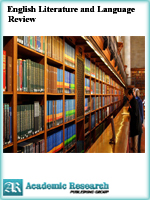English Literature and Language Review
Online ISSN: 2412-1703
Print ISSN: 2413-8827
Print ISSN: 2413-8827
Quarterly Published (4 Issues Per Year)

Archives
Volume 10 Number 1 January 2024
The Metonymy about Power in The Handmaid's Tale
Authors: Siyu Chen
Pages: 12-15
DOI: doi.org/10.32861/ellr.101.12.15
Abstract
As a speculative fiction, the book the Handmaid’s Tale written by the Canadian writer Margaret Atwood shows us a dystopian world where women are under the totalitarian rule by men, and not only women, men are also constrained by the totalitarianism in Gilead. Based on this, by applying the research method of textual analysis, the this paper mainly discusses the metonymies about power reflected in the Handmaid’s Tale, which are manifested in the dress color in Gilead, the stratification of the upper class and the naming of Handmaids in this book. Furthermore, this paper tries to unearth the underlying cause of the metonymies used in the Handmaid’s tale through specific analyses of the metonymies. And based on the result of the analyses, it indicates that to some extent, metonymy here can be a way to achieve power oppression.
National Identities in Major Emergency: A Corpus-based Analysis on Interactional Metadiscourse in Regular Press Conference about COVID-19
Authors: Wang Weichao ; Huang Xiaolin
Pages: 1-11
DOI: doi.org/10.32861/ellr.101.1.11
Abstract
Addressers’ metapragmatic awareness affects the language-choosing process and achieves diverse identities construction in different social contexts. Due to the COVID-19 epidemic, Chinese spokespersons endeavor to shape public opinions and defend national interest in Regular Press Conference through appropriately-employed languages, so as to avoid groundless criticism and probable panic among public. Based on Hyland’s model of interaction, the present paper thus explores the discursive construction of national identities in spokespersons’ remarks regarding the COVID-19. Verschueren’s Adaptation Theory is adopted to explain spokespersons’ employment of interactional metadiscourse in Regular Press Conference. The result shows that (1) self-mentions, attitude markers and boosters are made considerable use in remarks; (2) national identities as firm defender, responsible upholder and sincere friend are intentionally constructed; (3) spokespersons consciously adapt to the official context by adopting different metadiscourse resources. This analysis attempts to provide suggestions for international communication and shed some light on discursive strategies used in key context.



